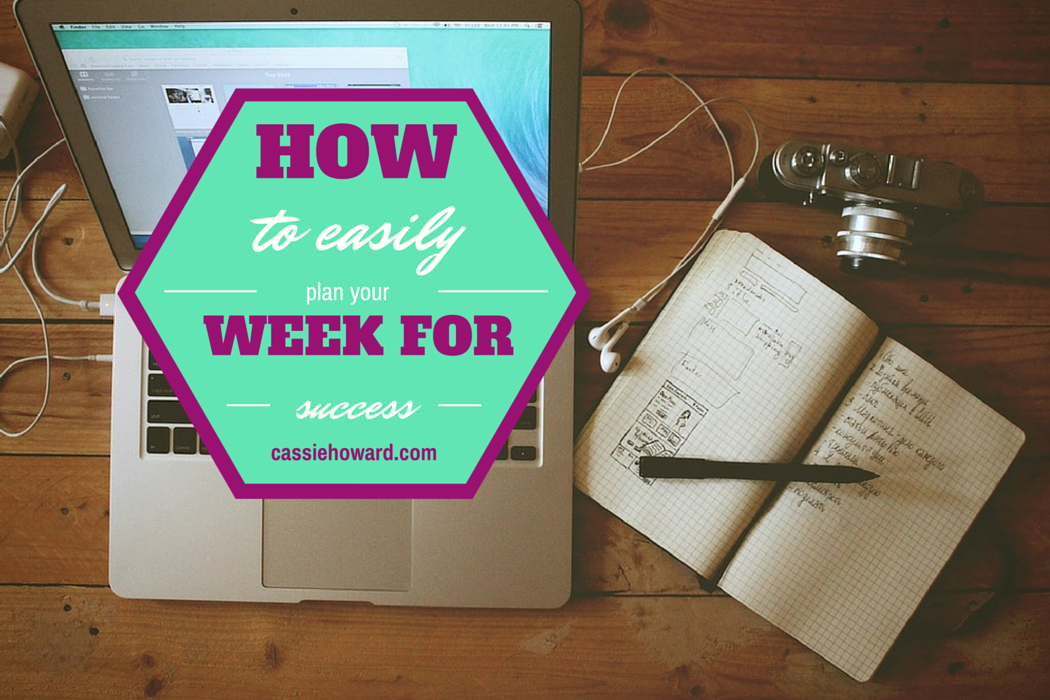Have you ever had one of those weeks where you wonder “where did the time go?” and “what did I actually DO this week?” or some other variation of those questions?
I have.
Sometimes, when we work from home, it’s easy to get distracted by other tasks that may seem important at the time, but aren’t. For example, just a few weeks ago, I was working on content for a course re-launch, and I had to go upstairs to get my sweater first, because I was cold. When I was up there, I noticed 3 full baskets of laundry that needed to be folded and put away. They’d been there for 3 days already.
So, what did I do? I sat down and folded them all, of course! My brain was screaming at me to get this task done, because it was SO important (even though it wasn’t). Without thinking twice, I folded the laundry and put it all away. It took me close to an hour.
By that time, I had to leave the house to go pick up my son from school (and once he’s home, I don’t usually do any more computer work) - which means I didn’t get to my course content. All because of some stupid baskets of laundry.
As you can see… it happens. I wish I could say that, after 7 years of running my business, that these distractions no longer phased me, but I’d be lying. Sometimes they do. What I’ve learned is that if I don’t have a list of weekly to-dos, these distractions seem to creep up on me more often.
So now, I plan out my to-dos & goals for the week every Sunday, and every night before bed, I look at that list, and make a to-do list for the next day.
This has helped me immensely in ignoring the distractions and focusing on only the tasks at hand for the day. Once those tasks have been completed, I can fold laundry. Or mop the floor. Or whatever else my messy house tells me to do next.
If you’re struggling with distractions when working from home, I highly recommend planning your week. Here’s the 3-step process I use:
Step 1: Brain Dump
The very first thing I do when I begin planning for the week ahead is to do a complete brain dump. Whatever to-dos I have floating around in my head (both personal AND business tasks), I write them all down. This could be anything from “clean the cat litter” to “write 2 chapters for my book manuscript”.
I write everything down, and get it out of my head. Once my head is clear, I move on to the next step.
Step 2: Check The Calendar
Once I’ve emptied my brain of to-dos, I move on to checking my calendar. I love using Google Calendar for all of my business and personal to-dos and events, so that’s what I pull up next. I take a look at the week ahead, and add all upcoming to-dos to my list. If I have a client meeting at 1pm on Tuesday, I write “______ (client’s name) meeting from 1pm-2pm”.
I add things to my Google Calendar in January when I’m planning my year, at the end of every month, and when new things come up (for example, if I just found out today that I had doctor’s appointment in 2 weeks at 10am, I would immediately go into Google Calendar and add it in). My Google Calendar always lists at least one to-do every single day (except weekends).
Step 3: Write Final Draft & Refer To Daily
Once all of my to-dos are added to my rough draft, I write a final draft. On this final “weekly to-dos” draft, I will list out every task I have to do for the week, and usually will include what day of the week this task needs to be done. This makes it easier for me when I’m creating my daily to-do lists.
Every night before bed, I make a to-do list for the next day. I refer to my weekly to-dos, and add items to my daily list from there. When I wake up in the morning, I can hit the ground running and make some serious progress in my life and business!
I’ve noticed that when I make these weekly & daily to-do lists, that the amount of distractions I encounter starts to drop. Sure, there are still distractions, but they are small, and manageable. Most of the time, I’m able to realize the distraction and ignore it, instead of giving in to the “DO IT NOW!” my brain is telling me.
I now get so much more done than before I had these lists. I go to bed at night, having crossed most things off my list (sometimes all!), feeling accomplished. I wake up excited to get to work on my list.
It’s been an amazing change in my life.
Do you plan your week, using weekly & daily to-do lists?


I’ve begun following the same system and I find I have also been more productive because of it.
Whoo hoo! Happy to hear that, Dianne!